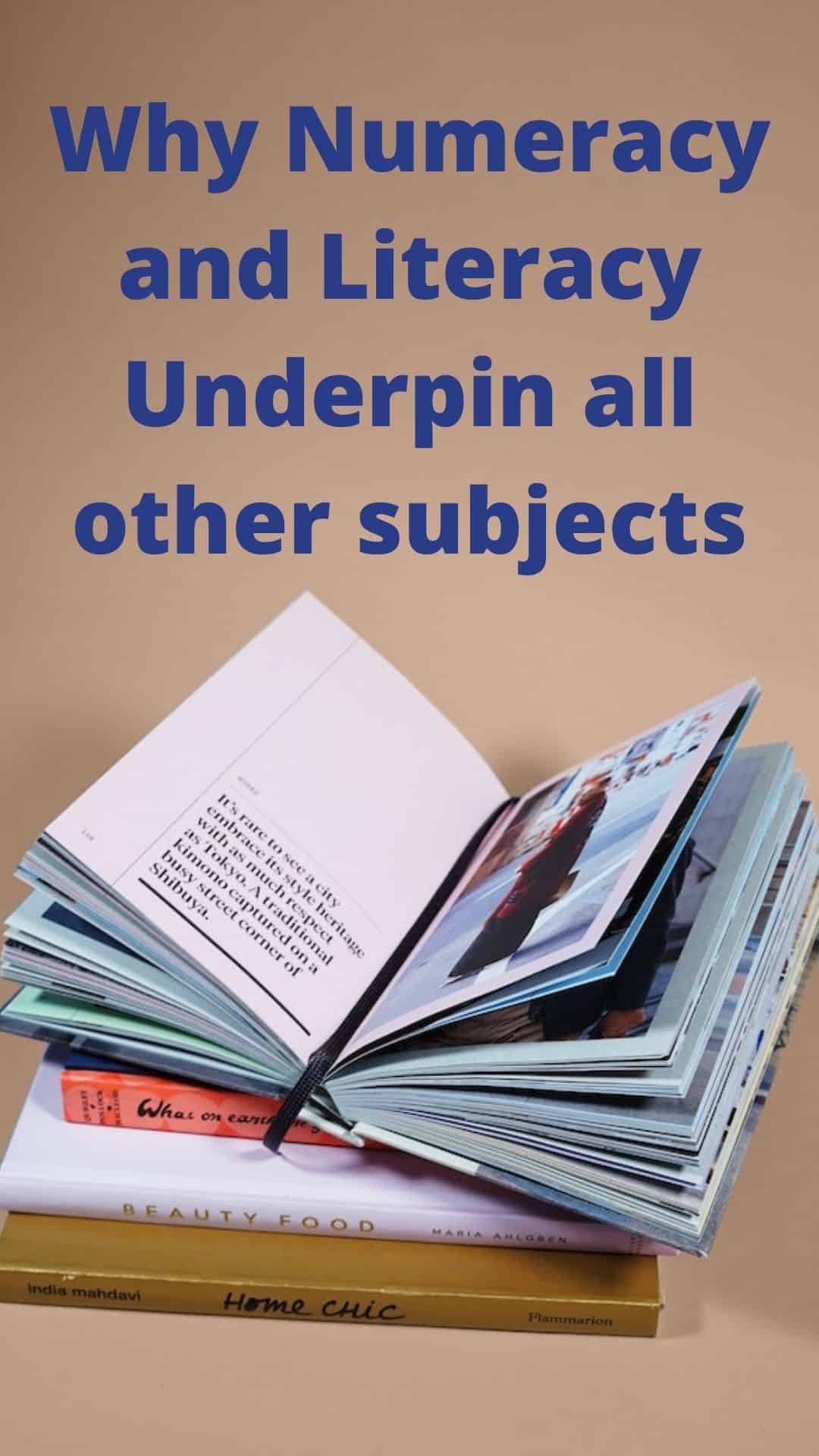
Why Numeracy and Literacy underpin all other subjects
In the current education arena, teachers and students are racing against the clock to cram in revision, extra practice and trying desperately to make up for lost time.
Due to lockdowns and restrictions, schools closing doors and online learning becoming a thing of the future, student's educational journey has been negatively impacted. Teachers are scratching their heads trying to figure out to catch up and fill in gaps.
We've called it the "Year of Intervention," and there's an important reason for that. We need to drastically overhaul the education system and provide the much-needed support to our young students. We must, as teachers and educators, be able to give our students what they need to succeed in life.
There's nothing like the struggle and pressure of having to figure it all out on your own. As teachers, most of the pressure is on us because we're the one's responsible! Although the state curriculum guidelines give us broad strokes of what is needed in each year level's yearly criteria, it's up to the teachers to make sure the students receive that knowledge.
When it comes down to it, numeracy and literacy are the two most important subjects. These must be the utmost priority at this time of intervention, and be first and foremost in the teaching approach for 2022.
What is numeracy?
Students become numerate as they develop the knowledge and skills to use mathematics confidently across other learning areas at school and in their lives more broadly. Numeracy encompasses the knowledge, skills, behaviours and dispositions that students need to use mathematics in a wide range of situations. It involves students recognising and understanding the role of mathematics in the world and having the dispositions and capacities to use mathematical knowledge and skills purposefully, according to the Australian Curriculum prospectus.
When teachers identify numeracy demands across the curriculum, students have opportunities to transfer their mathematical knowledge and skills to contexts outside the mathematics classroom. These opportunities help students recognise the interconnected nature of mathematical knowledge, other learning areas and the wider world, and encourage them to use their mathematical skills broadly.
With all the time that students have been missing class due to lockdowns, restricted movement and online learning, it's a big part of the role as a teacher to fill in the gaps. Because of the way maths is taught, missing a few classes in a row can have a huge negative impact on your student's learning. If they didn't understand multiplication when it was being taught, how can they move on to fractions and divisions?
If you need to test your student's understanding of core maths concepts, you can take the free diagnostic test here.
Why is numeracy important?
Numbers are the backbone of our entire civilisation, from geometric shapes to algebra, gravity and the equation of the cosmos. Mathematics governs the ratio of mixtures, ingredients, car engines and many other things.
Having a strong foundation of numbers also helps builds strong neurological pathways in the brain, and is important for students to develop logical thinking and reasoning strategies in their everyday activities. We need numeracy to solve problems and make sense of numbers, time, patterns and shapes for activities like cooking, reading receipts, reading instructions and even playing sport.
Understanding the way numbers work is called "maths." Being good at maths means you can not only recognise numbers but you also know what to do with them. If you have a friend that spends $35 on 12 sets of pencils and needs to know the cost of each item for his accounting records, do you add, multiply, divide or solve for the unknown?
Indeed, maths is an essential subject not only throughout school but also impacts future study options, employment opportunities and careers. It is crucial that teachers are equipped to confidently teach maths and numeracy skills to their students throughout their education, and especially now that many student classes and educational learning has been severely interrupted.

What is literacy?
According to the Australian Curriculum prospectus, students become literate as they develop the knowledge, skills and dispositions to interpret and use language confidently for learning and communicating in and out of school and for participating effectively in society. Literacy involves students listening to, reading, viewing, speaking, writing and creating oral, print, visual and digital texts, and using and modifying language for different purposes in a range of contexts.
Literacy encompasses the knowledge and skills students need to access, understand, analyse and evaluate information, make meaning, express thoughts and emotions, present ideas and opinions, interact with others and participate in activities at school and in their lives beyond school. Success in any learning area depends on being able to use the significant, identifiable and distinctive literacy and is representative of the content of that learning area.
Why is literacy important?
Reading and writing are human inventions, which have enabled us to create, store and make available to others across time and space a physical record of information and knowledge. In doing so, they have enabled successive generations to build upon the learning of those before them, and have enabled participation in political and social discourse in a way not previously imaginable, The Education Hub reports.
As James Murphy explains, in a recently published book entitled Literacy; An Evidence-Informed Guide for Teachers, "Written information has become the foundation on which the information revolution is built. Without access to this foundation, full participation in our society is impossible. Indeed poor literacy is so strongly correlated with poor life outcomes that it should be impossible to ignore."
While literacy often is equated with the subject of English at school, it is in fact fundamental to all curriculum areas, with each subject having its own peculiar literacy demands. We know, for example, that for some children who struggle with maths, it is not their mathematical knowledge that is lacking but rather they do not have the necessary reading skills (including background knowledge) to understand what a maths problem is asking them to do. It is essential, therefore, that schools are not only building students’ ‘generalised’ literacy but also their disciplinary literacy. Literacy, therefore, is the job of every teacher in a school.
Literacy is essential for employment. At the most basic level, without it, it becomes challenging to search for or read a job advertisement, put together a resume or read an employment contract. Within the discourse of the ‘future of work’, where an ever growing number of individuals and organisations are putting together lists of the must have skills and competencies for work in the twenty-first century, literacy, while often missing from the lists, underpins nearly all of the skills identified. In order to be able to think analytically and critically, to continually learn, to make effective decisions, or to be cognitively flexible, it is essential that one has the ability to engage with, understand and apply the ever increasing flow of information and knowledge that surrounds them.
Literacy also plays a fundamental role in everyday life; from being able to read labels on food at the supermarket, to reading road signs, to reading menus at the local café, or browsing the internet (as well as being able to utilise the internet to leverage the ongoing learning opportunities that it offers).
Why are these two subjects pivotal to education?
There's no such thing as being dumb at maths
Even though there needs to be a big focus on playing catch-up with numeracy and literacy for at least the next year, teachers need to be aware to not put too much pressure on students. Missing classes due to lockdowns and restrictions are out of our control, so we just have to make sure we do the best with what we have.
Making sure you encourage your students is important. Many students experience strong feelings of anxiety around maths, and how this next phase of education is handled will have strong ripple effects for your student's learning journey.
One important myth to dispel is "being dumb at maths." Most students who have a strong sense of maths anxiety believe that they are dumb, stupid or that they will fail at maths. That's what makes it so hard to engage and work through those hard maths equations.
There's simply no such thing as being dumb at maths. To make sense to students, maths must be taught using multisensory methods. This means engaging all four types of learning styles, making maths a visual, kinaesthetic and auditory experience. When taught using hands-on tools and resources, numeracy becomes much more engaging and students achieve much better results.

Want to save this article for later? Share on Pinterest.
Therefore, numeracy and literacy are the most important and fundamental subjects for students and it's essential that teachers can confidently fill in their student's gaps in knowledge at this time. Maths and English are intertwined subjects that must be taught with proper instruction and complete understanding for students to excel.
To support teachers, tutors and intervention specialists, we will be releasing a series of interviews with leading experts in speech pathology, dyslexia and learning differences, principals and education specialists who will be sharing their best techniques to help support student learning for 2022. You can also check out our upcoming Trainings to support confident teachers and educators here.
If you're interested in how multisensory methods can be used to teach core mathematical concepts, check out this article on How to teach place value.
Have you struggled teaching maths or English to your students? What worked and what didn't work?
Hope that helps,
Esther White
